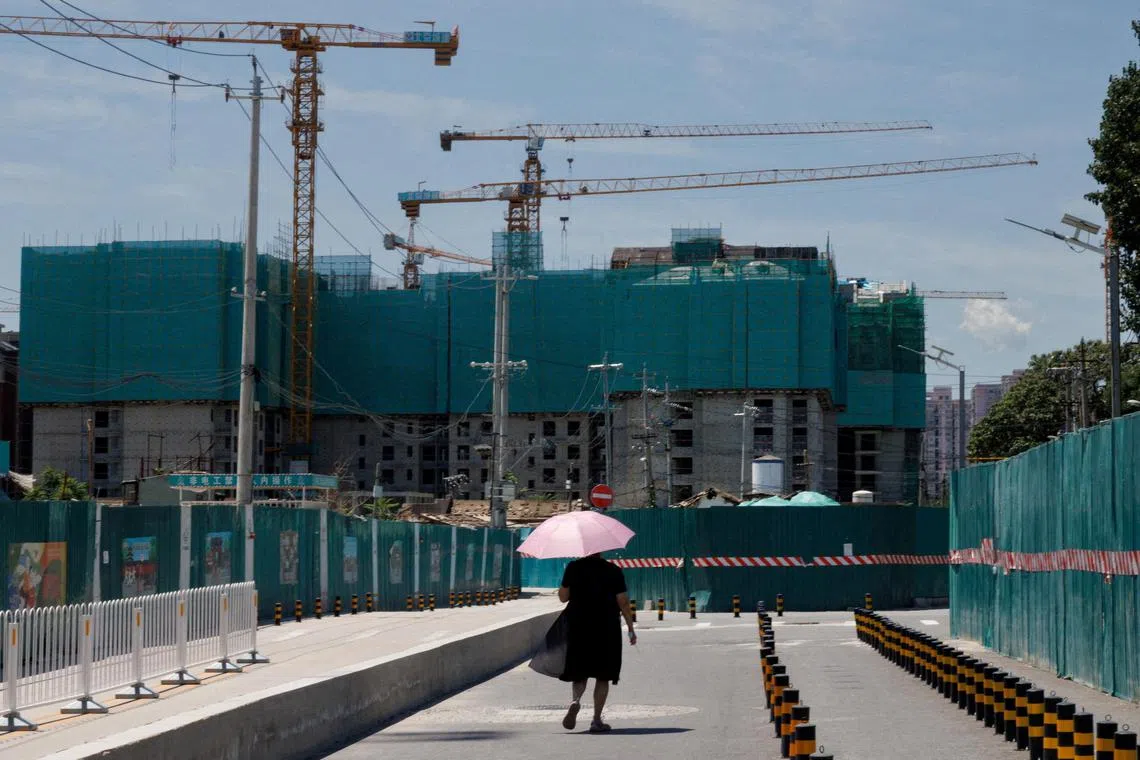China’s big-city home owners cash out as wealth dream fades
Sign up now: Get ST's newsletters delivered to your inbox

Asking prices in the financial hub have slumped for three straight months.
PHOTO: REUTERS
Follow topic:
SHANGHAI - Chinese home owners are losing conviction in their decades-long belief that property is a reliable store of wealth, undermining even coveted markets like Shanghai and adding pressure on the authorities to find new sources of economic growth.
Asking prices in the financial hub have slumped for three straight months, falling to the lowest level since before China emerged from Covid-19 lockdowns
Despite surging inventory, transactions in the city tanked by one-third to about 16,000 units in May compared with March, the Economic Observer reported in June.
Interviews with home owners, real estate agents and analysts suggest the downturn has been fuelled by waning faith that property will always be one of China’s safest investments.
While that shift in mindset has in some ways been welcomed by policymakers seeking to rein in speculative buying, the risk of a deeper-than-desired slump is rising at a time when the broader economy is losing momentum.
In the longer term, the authorities may struggle to replace real estate as a key driver of growth and bulwark of the nation’s vast middle class.
“Selling pressure is really piling up here” in Shanghai, said Ms Li Jun, chief investment officer at Power Sustainable (Shanghai) Investment Management, a Canadian financial firm. “It seems home owners have reached a consensus that the market has peaked.”
Mr Song, a banker who recently sold his apartment in Shanghai’s prestigious Jing’an district for about 10 million yuan (S$1.88 million), said he views this as one of the last windows to cash out of the property boom.
The 35-year-old still owns other properties in China with his family, but wants to reduce exposure to the sector due to expectations of property taxes and a prolonged slowdown in the sector.
His experience is matched across the country.
Existing home prices in 100 cities recorded the biggest decline in May
“Shanghai has the most sluggish existing-home market in China right now,” said research director Yan Yuejin from E-house China Research and Development Institute. “Across the nation, supply and demand in the secondary market have also deteriorated.”
Home owners in the southern metropolis of Shenzhen have cut prices to the lowest since October 2016, according to data compiled by Centaline Group.
Ms Li said people are seeking to sell due to concerns about the economic outlook, financing needs for cash-strapped businesses and unemployment.
In Hangzhou, the home base for Alibaba Group Holding, a seller in the suburbs cut asking prices by 17 per cent after failing to find a buyer in six months, according to a housing agent surnamed Gong.
The weakening sentiment in China’s real estate sector is prompting policymakers to weigh new support measures to keep the economy afloat, Bloomberg reported in June.
Regulators are considering reducing down payments in some non-core neighbourhoods of major cities, lowering agent commissions on transactions, and further relaxing restrictions for residential purchases.
The days of roaring demand are unlikely to come back any time soon, according to Goldman Sachs analysts, who said China could experience an “L-shaped” real estate market.
This “cycle is different from previous rounds, as policymakers appear very determined not to use the property sector as a short-term stimulus tool”, Goldman analysts wrote in a June 11 note. “We believe the policy priority is to manage the multi-year slowdown rather than to engineer an upcycle.”
In the longer term, China is experiencing a structural shift due to its ageing population,
The country’s urbanisation rate is expected to peak at about 75 per cent, up from 64.7 per cent in 2021 – all of which is weighing on sentiment.
Such pessimism is increasingly showing in Shanghai, as tough Covid-19 measures in the last three years and weakening confidence in China’s economic outlook pushed home owners and tenants – many of whom are expats – to pack up and leave.
Favoured by foreign companies, Shanghai was home to a quarter of China’s expatriate population before 2022.
The city saw an exodus after the lockdown that kept nearly 25 million people confined to their homes for more than two months.
About 25 per cent of Germans living in the city left in the fallout, while the number of French and Italian citizens registered with their governments each fell by 20 per cent, according to a report by the Shanghai chapter of the European Union Chamber of Commerce early in 2023. BLOOMBERG

